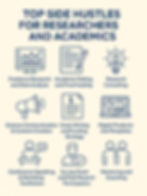Top 10 Side Hustles for Researchers and Academics
- Fadl Rahman Essel
- May 24, 2025
- 5 min read

The landscape of research and academia is shifting. Academic jobs are more competitive, research funding is increasingly scarce, and the tenure track is no longer the only path to success. For many researchers, these challenges are prompting a new question:
How can I leverage my skills beyond the lab or classroom to generate extra income?
Welcome to the world of side hustles for researchers—a world where data analysts moonlight as consultants, PhDs teach on-demand courses, and grant writers help nonprofits secure six-figure awards. These income-generating activities are not only financially rewarding but also professionally enriching.
This comprehensive guide will walk you through the top 10 side hustles for researchers and academics, why they work, how to get started, and how to align them with your research-driven skillset.
Why Side Hustles Are Ideal for Academics and Researchers
Before jumping into the options, it’s important to understand why side hustles are particularly suited for people in research roles:
Transferable Skills: Critical thinking, writing, analysis, and project management are in demand everywhere.
Flexible Scheduling: Many opportunities are project-based or asynchronous.
Minimal Startup Costs: Most can be launched using your existing laptop, skills, and network.
Diverse Income Streams: Reduce dependency on grants or university stipends.
Career Insurance: In uncertain academic climates, diversifying income adds security.
Whether you’re a doctoral student, postdoc, adjunct, or seasoned researcher, you have something valuable to offer outside your institution—and often, you can get paid well for it.
Top 10 Side Hustles for Researchers and Academics
Let’s explore some of the most popular, flexible, and high-impact side hustles for research professionals.

1. Freelance Research and Data Analysis
One of the easiest side hustles to start is offering freelance support for data-heavy projects. You already know how to interpret complex datasets—many businesses and NGOs need that skill.
What You Can Do:
Clean and analyze quantitative or qualitative data
Conduct literature reviews
Write and format research reports
Design survey tools
Who Needs This:
Nonprofits and foundations
Health and education agencies
Academic research teams short on staff
Marketing firms needing user behavior analysis
Where to Find Work:
Kolabtree (ideal for science freelancers)
Upwork or Freelancer
Academic job boards or research networks
Tips:
Create a strong profile or personal website showcasing past work
Offer a free consultation call to potential clients
Use testimonials and case studies to build trust
2. Academic Editing and Proofreading
Editing and proofreading services are in high demand, especially for international scholars publishing in English-language journals.
Services to Offer:
Journal manuscript editing
Thesis and dissertation proofreading
APA/MLA/Chicago formatting
Reference management support (Zotero, EndNote)
Platforms to Join:
Enago, Cactus Communications, Editage
Freelance networks or direct outreach to university departments
Best For:
Language-savvy researchers
PhDs in humanities, social sciences, and health fields
Bonus Tip:
Offer bulk editing packages or recurring monthly services for labs and institutions.
3. Research Consulting
Research consulting involves working with clients—companies, startups, NGOs, or think tanks—to provide expert advice, analysis, or implementation for research-based projects.
Types of Projects:
Designing and evaluating programs
Conducting needs assessments
Producing white papers and technical briefs
Supporting academic-to-industry translation
Clients May Include:
Government ministries
Public health programs
EdTech startups
Policy think tanks
Where to Promote Yourself:
LinkedIn and ResearchGate
Join consulting platforms like Maven, GLG, or Expert360
Collaborate with firms like JMK Consulting as an associate expert
Tips:
Focus on a niche (e.g., global health, education policy, environmental science)
Set clear pricing and offer value-based packages

4. Online Teaching and Course Creation
Teaching outside the university system is now easier than ever thanks to e-learning platforms.
Popular Platforms:
Udemy
Skillshare
Teachable
Thinkific
Course Topics That Sell:
Research methods (quantitative & qualitative)
Data analysis software (SPSS, R, NVivo)
Grant writing
Academic writing or publishing strategies
Passive Income Potential:
Create the course once, market it, and earn income for months or years.
Bonus Idea:
Offer live webinars or masterclasses via Zoom and charge per session or series.
5. Grant Writing and Proposal Support
Grant writing is a valuable skill—and one that can be outsourced. Many small nonprofits, startups, and early-career researchers need help finding and applying for funding.
Services to Offer:
Writing full proposals
Editing and formatting existing drafts
Developing budgets and logic models
Identifying funding opportunities
Best For:
Researchers experienced in academic or institutional grants (NSF, NIH, ERC)
Writers with clarity, structure, and storytelling skills
How to Market:
Join nonprofit consultant directories
Network with university research offices
Partner with consultants or grant-writing agencies
6. Science Communication and Blogging
As science becomes more public-facing, there's a growing market for professionals who can explain research clearly to non-specialists.
Ways to Monetize:
Start a science blog with ads and sponsorships
Create YouTube videos or podcasts
Freelance for science magazines and websites
Become a social media influencer in your research niche
Audience Ideas:
High school or undergrad students
Busy policymakers
Curious non-experts
Corporate decision-makers
Tools to Try:
Medium.com, Substack, or your own blog
Canva for infographics and visuals
7. Digital Products and Templates
Sell what you’ve already created—yes, really. Many researchers already have tools, resources, or templates that others would pay for.
Examples:
Thesis planning dashboards (Notion, Trello)
Data analysis workflow guides
Presentation slide templates
Lab report checklists or SOPs
Where to Sell:
Gumroad
Etsy
Payhip
Your personal website with Shopify or Wix integration
SEO Tip: Use long-tail keywords to describe your product (e.g., “Notion template for academic research”)
8. Academic Coaching and Mentoring
Many students and early-career researchers need guidance on navigating graduate school, publication, or career transitions. You can become a coach or mentor, offering structured sessions.
Topics to Coach:
Thesis/dissertation planning
Journal publication strategies
Time and project management
Navigating postdoc to industry paths
How to Get Clients:
Offer free webinars or Q&A sessions to showcase your value
Build an email list and offer coaching packages
Create content on LinkedIn or YouTube to build trust
9. Paid Speaking Engagements and Workshops
If you’re comfortable speaking, you can turn your expertise into revenue through conferences, guest lectures, and corporate workshops.
Opportunities Include:
Academic and industry conferences
Online summits and webinars
Faculty development programs
Government and nonprofit staff training
Topics In Demand:
Research methods training
DEI in research
Impactful science communication
Grant writing workshops
10. Participate in Paid Research Panels or Surveys
This isn’t a business model, but it’s a great low-effort income stream.
Try Platforms Like:
Prolific
User Interviews
GLG or Guidepoint for expert calls
Who Qualifies:
Researchers with niche knowledge
Anyone willing to participate in 30–60 minute surveys or interviews
How to Balance Side Hustles with Research Life
Adding a side hustle shouldn't mean burning out. Here are ways to stay productive and sane:
Time block dedicated hours weekly for side work
Set SMART goals for each hustle (Specific, Measurable, etc.)
Use tools like Notion, ClickUp, or Asana to track projects
Choose 1–2 side hustles max to avoid distraction
Celebrate small wins and take breaks

Closing: Create a Research Life You Love
Side hustles are more than financial tools—they’re career accelerators, creative outlets, and stepping stones to independence. As a researcher or academic, your skill set is rare and valuable. You don't have to wait for a promotion, grant, or tenure to level up.
Start with one small project. Offer one service. Share your work online. Over time, you’ll build income, confidence, and freedom.
At JMK Consulting, we believe in empowering knowledge workers like you to thrive both within and beyond the lab. Whether you're looking to build a full consulting practice or just earn extra income, there's never been a better time to start.




















